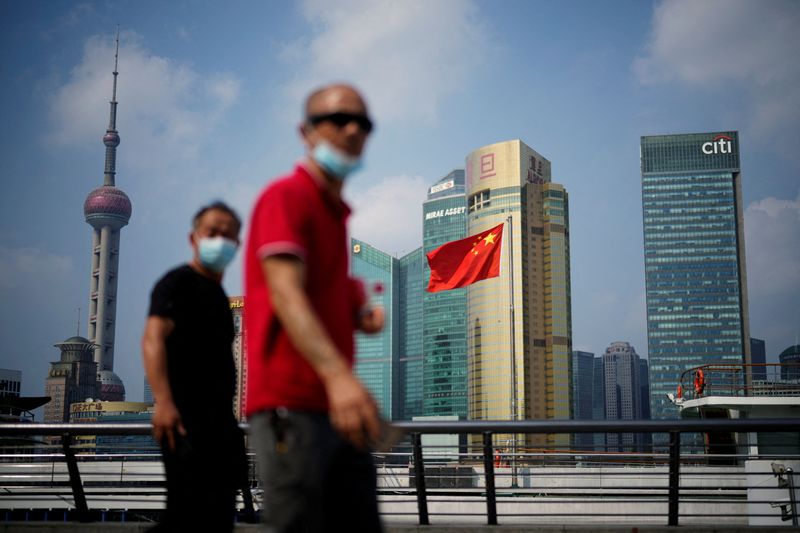European investment in China concentrates more on handful of large firms -report
2022.09.14 19:06
[ad_1]

© Reuters. FILE PHOTO: People wearing face masks following the coronavirus disease (COVID-19) outbreak walk past a Chinese flag in Shanghai, China August 2, 2022. REUTERS/Aly Song/File Photo
BERLIN (Reuters) – European investment in China is growing more concentrated with a handful of large firms particularly from Germany doubling down on their bets while virtually no new players seek to enter the market, according to a new report by research organization Rhodium Group.
The three big German automakers – Volkswagen (ETR:), BMW and Daimler (OTC:) – as well as chemicals group BASF, accounted for a third of all European investment into China from 2018 to 2021, according to the report.
Germany as a whole, where former Chancellor Angela Merkel actively encouraged and aided companies to enter the Chinese market, accounted for 43% of foreign direct investment (FDI) over those four years, compared with 34% in the previous decade.
The report comes amid growing concerns about the ruling Communist Party’s tightening grip on Chinese society and the economy, which have contributed to the decision by Germany’s new government to reduce dependency on China.
Ironically, it is partly such signs of geopolitical tensions that are pushing some companies to increase investment in China in order to localize staff and supply chains and therefore ringfence business, according to the report.
“European investment has grown much more concentrated, both in terms of the companies that are investing there, the countries they come from, and the sectors in which they operate,” the authors wrote.
Germany, the Netherlands, Britain and France made up 87% of investment over the last four years compared with 69% in the previous decade, according to the report.
Five sectors – autos, food processing, pharma/biotech, chemicals and consumer products manufacturing – now make up nearly 70% of all FDI, compared with 57% in 2008-2012 and 65% in 2013-2017.
Meanwhile, stakeholders on the ground say that virtually no new European investors have made direct investments in the country since the outbreak of the pandemic, according to the report.
“This may be a temporary phenomenon, related to the pandemic and China’s zero-COVID response,” the authors wrote. “However, conversations with stakeholders suggest that a longer-term dynamic may be at work, with smaller European companies reluctant to accept the growing risks of investing in China.”
[ad_2]
Source link








